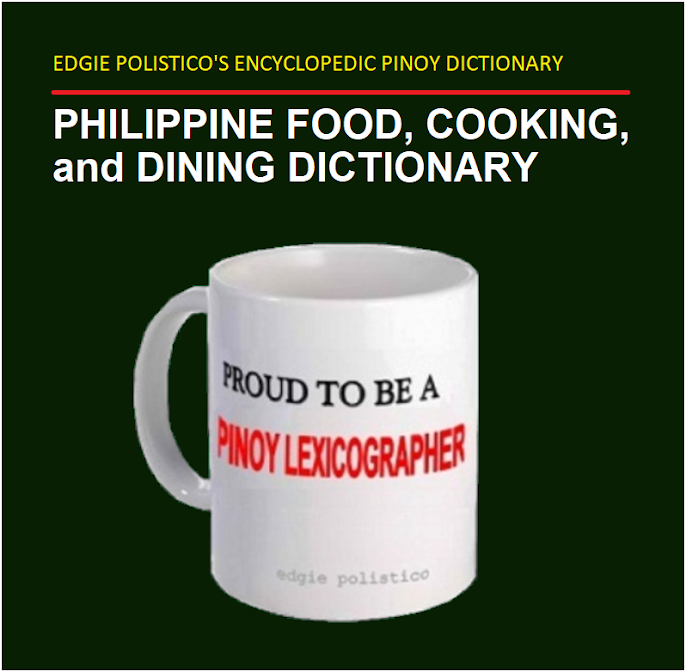Other local names
ja in Tausug (Suluanon, Joloanon, and Tawi-tawianon)
amik in Davao del Sur & South Cotabato
lukot-lukot in Chavacano (Zamboangueño)
tagaktak in Cebuano
This native snack of Maguindanaons looks like a triangular net of fine and curly strands of browned pancit bihon. This is similar to Cebuano’s tagaktak
which is also folded into a triangle.
This delicacy is made
with finely ground rice, sugar, and some water, mix well
to become a thick but flowing batter. The batter is placed
in a pangulayan (a native coconut shell
strainer). The batter would pass through the tiny
perforation drilled at the bottom of the coconut shell, coming
out like a string of noodles falling directly into the hot pan
with cooking oil. The pangulayan is quickly
swayed in crisscrossing or circular motion so the falling
strands would create a net-like pattern on the pan. The
falling strands of batter are quickly fried and cooked until it
is golden brown and crisp. Using gagawi
(long wooden ladle), the rice fritter is removed from the
pan and immediately folded into a half-moon (done by folding once into a semi-circle) or rolled to form a tube. Tinagtag would stiffen and turn crisp as soon as it cool down.
.JPG) |
Maguindanaon vendors of native delicacies at the Cotabato City's Super Market (not supermarket). |
As part of the ceremonial cooking, the Maguindanaons
would ask first for the blessings of Allah before cooking this delicacy. They also profess that the presence of a wicked person or someone who has a bad disposition, while tinagtag is being prepared, would cause the tinagtag to have an unpleasant taste or easily get spoiled.
A good and finely cooked rice fritter has a shelf life of one month or even more. Maguindanaons traditionally would prepare and offer this delicacy during special occasions such as weddings, feasts, and during the observance of Eid al Fitr or the end of Ramadan or Maulidin Nabi.
They traditionally have to perform the ceremonial preparation and cooking of tinagtag while listening to the rhythmic beat of balabad (wooden drumstick) and dabakan (a native drum made with dried animal skin).
Two shapes of tinagtag sold by Maguindanaon vendor at the Cotabato City Public Supermarket in Cotabato City, Maguindanao province. Above, is the half-moon or semi-circle (folded disc-shaped tinagtag). Below, is a tubular or rolled tinagtag.
.JPG&container=blogger&gadget=a&rewriteMime=image%2F*)
All photos by Edgie Polistico are copyrighted. ALL RIGHTS RESERVED.
If you liked this post and our site, share it.
Let us know your opinion on the subject. Feel free to comment in the comment section, below. It is important for us to know what you think.
Tell us what other topics you would like us to write, share, and discuss about.
All photos by Edgie Polistico are copyrighted. ALL RIGHTS RESERVED.
If you liked this post and our site, share it.
Let us know your opinion on the subject. Feel free to comment in the comment section, below. It is important for us to know what you think.
Tell us what other topics you would like us to write, share, and discuss about.
For more about Filipino food, see this Philippine Food, Cooking, and Dining Dictionary. It is OPEN and FREE.
Continue to follow my blogs. You can also follow and learn more by joining us in our Facebook group. Have more bits and pieces about our kind of food, ingredients, and ways of cooking, dining, and knowing food culture across the 7,641 islands of the Philippines.
Encouragement and enthusiasm are not enough. I also need moral support, prayers, and anything else that can uplift my spirit and keep my good reasons. Keep them coming. All I know is that I am happy with what I am sharing and giving away. If you are pleased and happy with what I am doing, just smile and please share the happiness. Keep sharing and include to share the PHILIPPINE FOOD ILLUSTRATED. I feel energized when my blog becomes one of the reasons why you are happy and smiling.
Edgie Polistico
For more about Filipino food, see this Philippine Food, Cooking, and Dining Dictionary. It is OPEN and FREE.
Continue to follow my blogs. You can also follow and learn more by joining us in our Facebook group. Have more bits and pieces about our kind of food, ingredients, and ways of cooking, dining, and knowing food culture across the 7,641 islands of the Philippines.
Encouragement and enthusiasm are not enough. I also need moral support, prayers, and anything else that can uplift my spirit and keep my good reasons. Keep them coming. All I know is that I am happy with what I am sharing and giving away. If you are pleased and happy with what I am doing, just smile and please share the happiness. Keep sharing and include to share the PHILIPPINE FOOD ILLUSTRATED. I feel energized when my blog becomes one of the reasons why you are happy and smiling.
Edgie Polistico
.JPG)
.JPG)
.JPG)
.JPG&container=blogger&gadget=a&rewriteMime=image%2F*)






No comments:
Post a Comment
Feel free to write your thoughts now.